九年级 Unit 9I like music that I can dance to sectionB(2a-2e)课件(共33张PPT)
文档属性
| 名称 | 九年级 Unit 9I like music that I can dance to sectionB(2a-2e)课件(共33张PPT) | 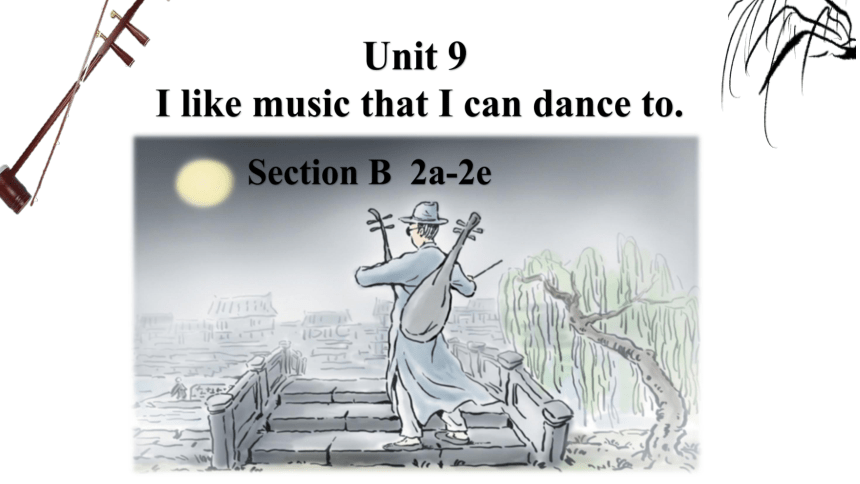 | |
| 格式 | pptx | ||
| 文件大小 | 5.2MB | ||
| 资源类型 | 教案 | ||
| 版本资源 | 人教新目标(Go for it)版 | ||
| 科目 | 英语 | ||
| 更新时间 | 2023-12-06 18:07:43 | ||
图片预览

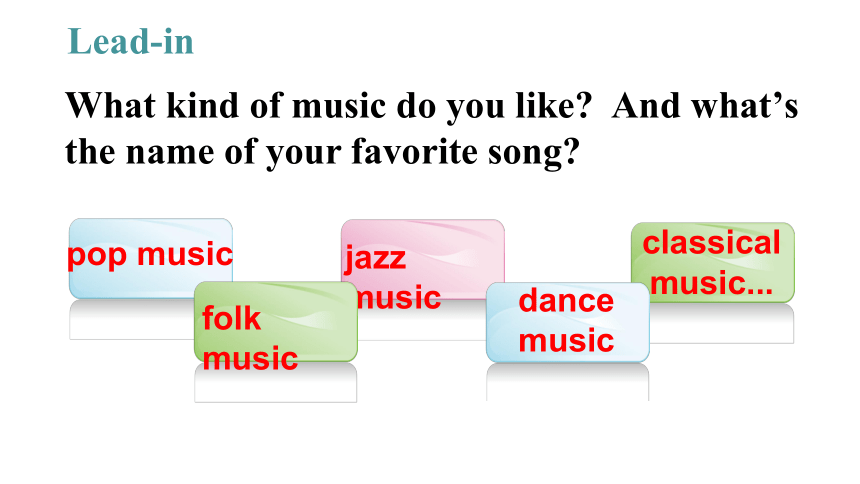
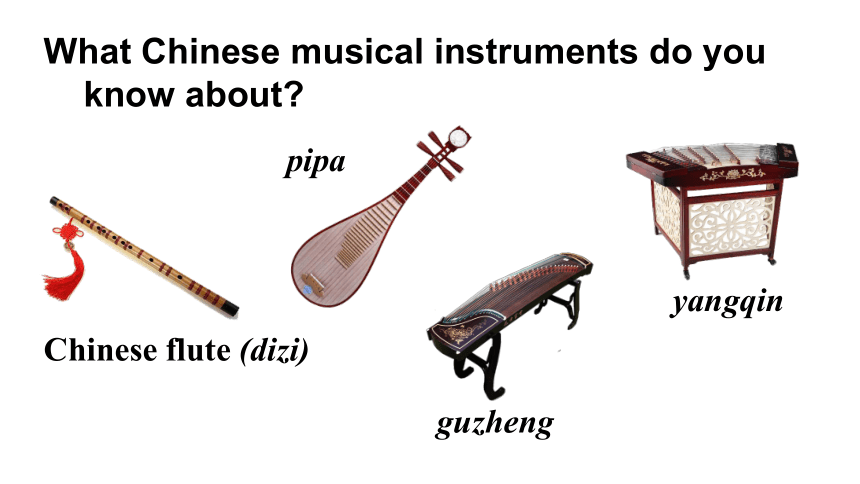

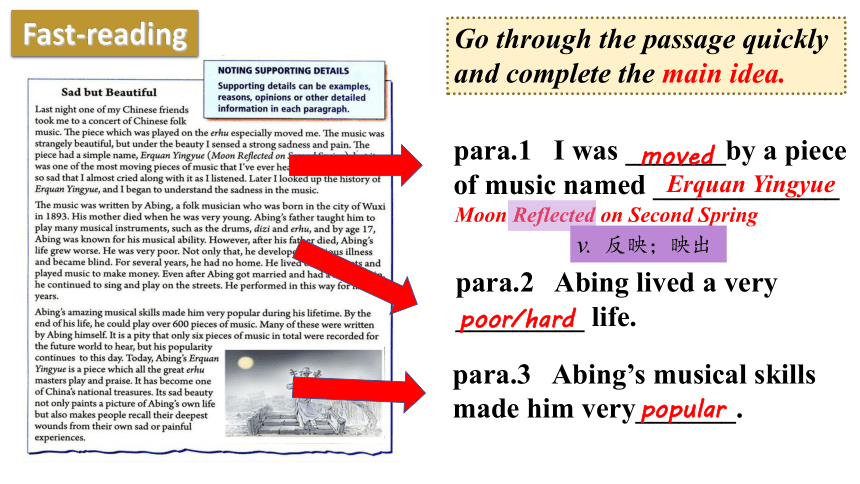
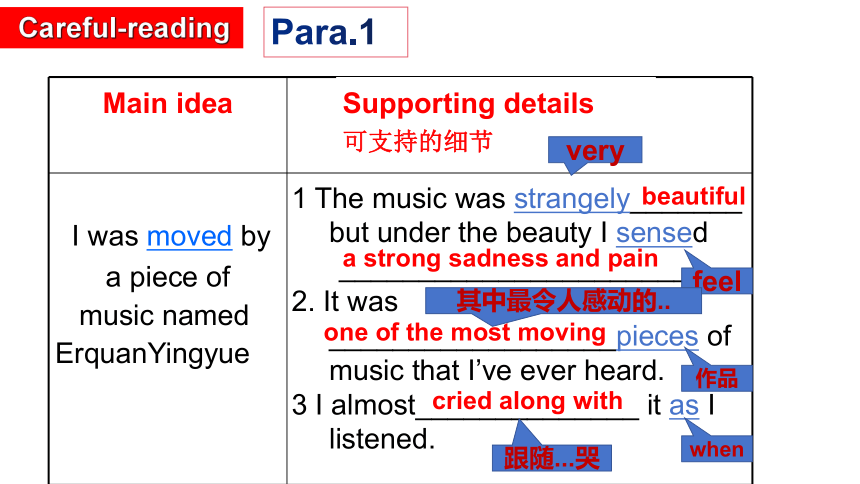
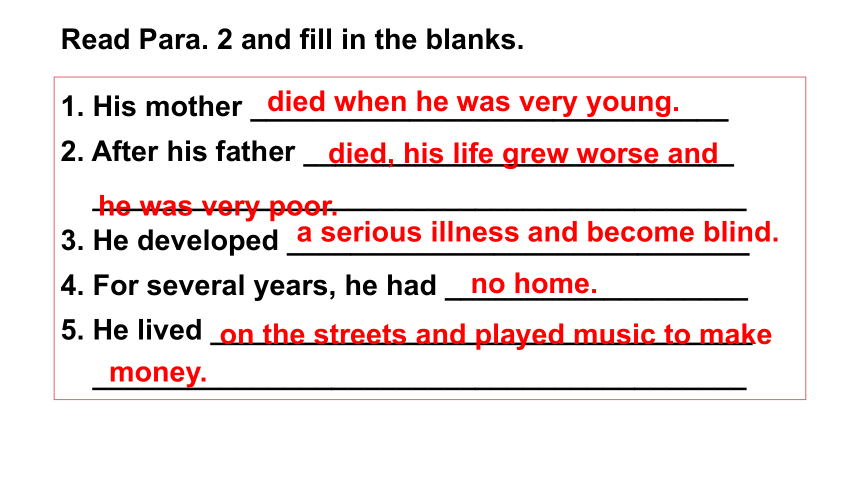
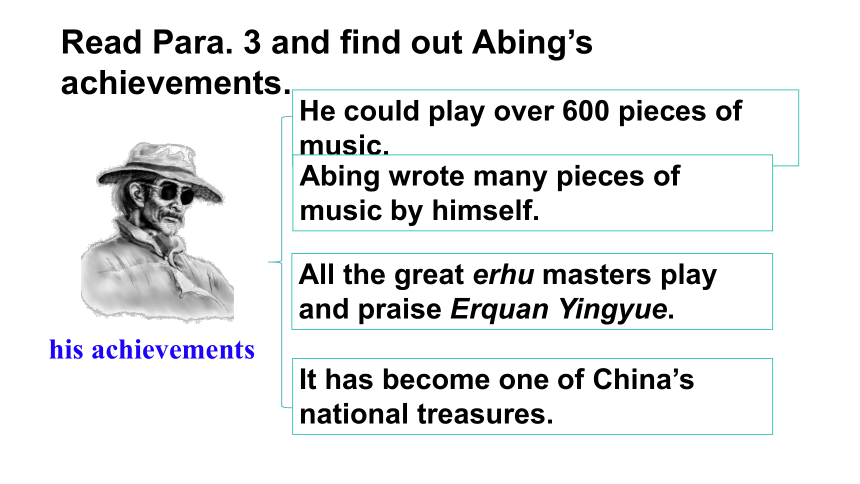
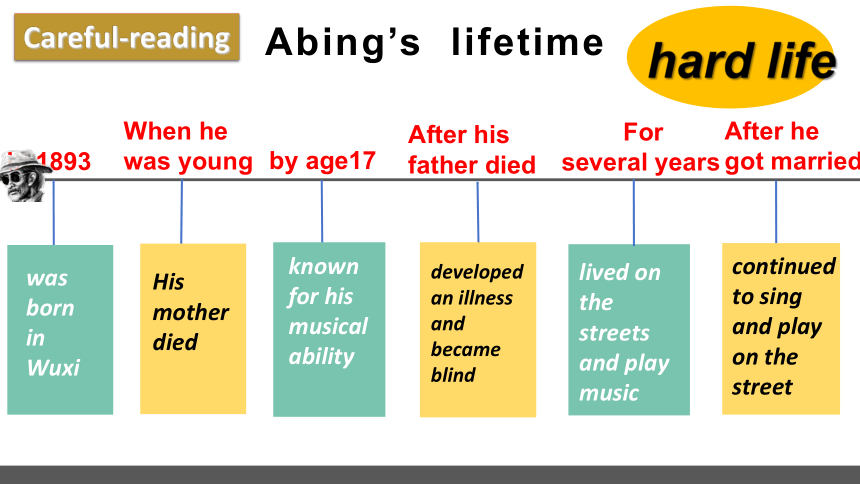
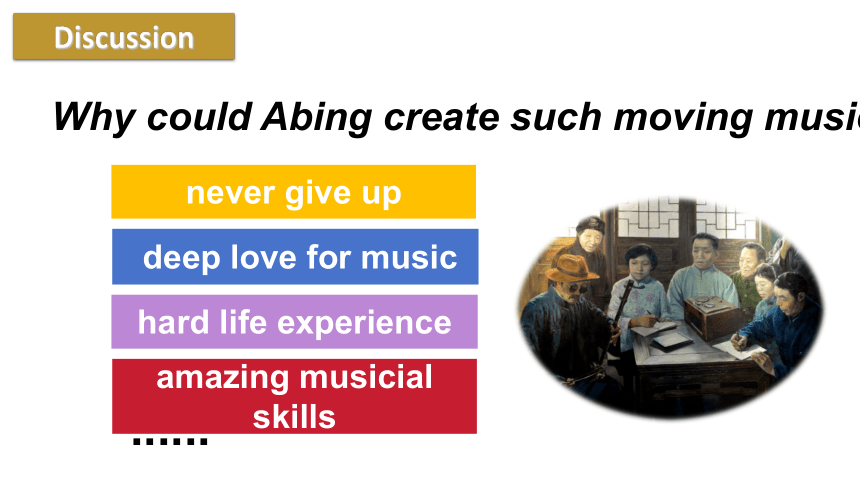
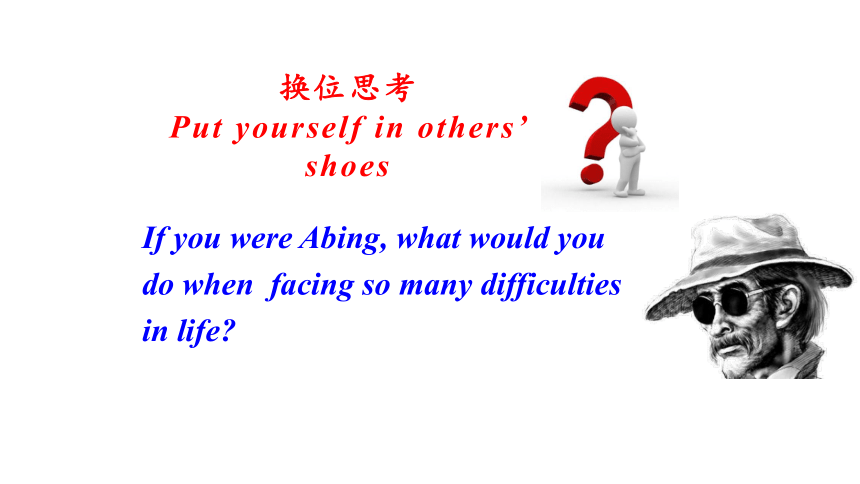
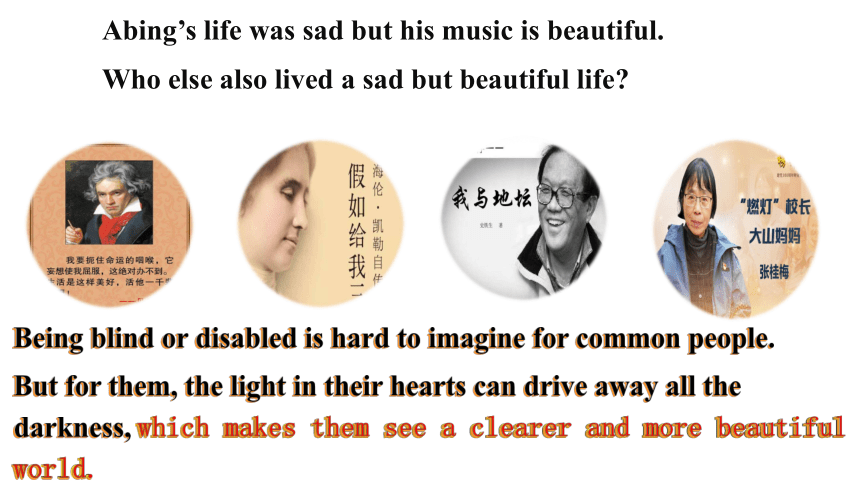
文档简介
(共33张PPT)
Unit 9
I like music that I can dance to.
Section B 2a-2e
jazz music
classical music...
Lead-in
What kind of music do you like And what’s the name of your favorite song
pop music
folk music
dance music
What Chinese musical instruments do you
know about
Chinese flute (dizi)
pipa
guzheng
yangqin
1.Which musician is the passage mainly about
2.What is the name of his most
famous piece of music
3.How does the writer feel about
this piece of music
Read quickly and answer the questions.
It is mainly about Abing.
Erquan Yingyue.
Sad but beautiful.
Fast-reading
para.1 I was _______by a piece of music named _____________
para.2 Abing lived a very _________ life.
para.3 Abing’s musical skills made him very_______.
Go through the passage quickly and complete the main idea.
moved
poor/hard
popular
Erquan Yingyue
Moon Reflected on Second Spring
v. 反映;映出
Main idea
I was moved by a piece of music named ErquanYingyue
1 The music was strangely_______ but under the beauty I sensed
______________________.
2. It was __________________pieces of music that I’ve ever heard.
3 I almost______________ it as I listened.
beautiful
a strong sadness and pain
cried along with
one of the most moving
Supporting details
可支持的细节
Careful-reading
Para.1
very
feel
其中最令人感动的..
作品
跟随...哭
when
Read Para. 2 and fill in the blanks.
1. His mother ______________________________
2. After his father ___________________________
_________________________________________
3. He developed _____________________________
4. For several years, he had ___________________
5. He lived __________________________________
_________________________________________
died when he was very young.
died, his life grew worse and
he was very poor.
a serious illness and become blind.
no home.
on the streets and played music to make
money.
Read Para. 3 and find out Abing’s achievements.
his achievements
He could play over 600 pieces of music.
Abing wrote many pieces of music by himself.
All the great erhu masters play and praise Erquan Yingyue.
It has become one of China’s national treasures.
Abing’s lifetime
in 1893
When he
was young
by age17
After his
father died
For
several years
was
born
in
Wuxi
His
mother
died
known for his
musical
ability
lived on
the streets
and play music
continued
to sing
and play on the street
Careful-reading
developed an illness and
became blind
After he
got married
hard life
Why could Abing create such moving music
Discussion
amazing musicial skills
never give up
hard life experience
deep love for music
......
换位思考
Put yourself in others’ shoes
If you were Abing, what would you
do when facing so many difficulties
in life
Abing’s life was sad but his music is beautiful.
Who else also lived a sad but beautiful life
Being blind or disabled is hard to imagine for common people.
But for them, the light in their hearts can drive away all the darkness, which makes them see a clearer and more beautiful world.
2c
Read the passage again and use suitable words to
complete the main idea of each paragraph. Then list the supporting details in each paragraph.
Paragraph Main idea Supporting details
1 I was by a piece of music named Erquan Yingyue. The music was strangely beautiful…
2 Abing lived a very life.
3 Abing’s musical skills made him very .
Paragraph Main idea Supporting details
1 I was______ by a piece of music named Erquan Yingyue.
moved
The music was strangely beautiful but under the beauty I sensed a strong sadness and pain.
It was one of the most moving pieces of music I’ve ever heard.
The erhu sounded so sad that I almost cried along with it as I listened.
Paragraph Main idea Supporting details
2 Abing lived a very____ life.
hard
His mother died when he was very young.
His father died when he was a teenager.
He was poor and homeless.
He developed an illness and became blind.
He lived on the streets and played music to make money.
Paragraph Main idea Supporting details
3 Abing’s musical skills made him very .
popular
He could play over 600 pieces, and he wrote many of them himself.
His most famous piece is still played and praised by erhu masters today.
Erquan Yingyue has become one of China’s national treasures.
2d
Circle that or who and fill in the blanks with the words in the box.
Abing played music (that/who) could touch the hearts of people. When we listen to his music, we can _________ both the beauty and the sadness in it. It makes us think about the ________ and _________ (that/who) we have experienced in the past. For this reason, many people _________ him as the musician who has greatly influenced erhu music. So it is really a _________ that not many pieces of his music were recorded.
pain
wounds
sense
pity
praise
sense
wounds
pain
praise
pity
2e
Student A is a foreign visitor who is interested in Abing and his music. Student B is a Chinese student who knows about Abing. Use the information in the passage to make a conversation.
A: What kind of musical instruments did
Abing play
B: He could play many instruments, but he is
best known for playing the erhu.
Name:_________ Date of birth:_________
Hometown:___________ Profession:____________
Musical instruments:_________________
The number of pieces:___________
The most famous piece:________________
Important events:
★His mother died when __________________.
★Abing was known for his musical ability b age________.
★He developed a serious illness and became blind
after _______________.
★He lived on the street and played music to make
money for ________________.
Abing's ID card
Abing
1893
Wuxi
folk musician
the drums,dizi,erhu…
over 600
Erquan Yingyue
he was very young
17
his father died
many years
Summary
1.The piece which was played on the erhu
especially moved me.
move在这里的意思是“感动;打动”
The story of their suffering moved us deeply.
他们的苦难经历深深感动了我们。
I was truly moved by his tears. 我的确被他的眼泪打动了。
be moved to tears 感动得流泪
Language points
moved作为及物动词,意为 “打动;使感动”可用于被
动语态。
What he said moved everyone present.
We were all moved by his story.
move 还意为“移动;搬动” 常用 “move to” 搬到某地。
That chair is in the way, please move it.
My family move to Beijing when I was young.
moving adj. 移动的;使……移动的; 令人感动的
The train was like a moving town.
这列火车就像一个移动的城镇。
2.I sensed a strong sadness and pain.
sense在这里作动词,意思是“感觉;意识到”
The horses sensed danger and stopped.
Lisa sensed that he did not believe her.
sense 作为名词,意为“感觉;意识”
常见搭配有make sense “有意义;有道理”
I lost my sense of taste.
The sentence doesn’t make sense.
pain 意为 “痛苦;疼痛;苦恼”
He has a pain in the knee. 他膝盖酸痛。
注意:
表示人“身体某个部位疼痛”要用have a pain / pains in ...
其中pain是可数名词,表示具体的疼痛部位。
painful adj. 痛苦的;疼痛的;费力的
She had a painful cut on her thumb.
她的拇指上有个很疼的伤口。
sadness意为“悲痛;悲伤”,其反义词为
happiness 意为“幸福”。
Tom loved his wife so much that he didn’t get over the sadness of losing her last year.
The death of his good friend gave him much .
A. ache B. sore C. pain D. hurt
C
3.He performed in this way for many years.
perform 动词,意为“表演;演奏;执行”
He wants to perform in the show.
He performed perfectly on the piano.
performance为其名词,意为“表演;演出”
I hear there will be two performances tomorrow.
performer意为“表演者”
The performer acted the play wonderfully.
by the end of 后可接表示过去的时间,与过去完成时连用;也可接表示将来的时间,与现在完成时连用。
at the end of 表示“在……结束时;在……的尽头”,既可与表示时间的词连用,也可与表示地点的词连用。
4.By the end of his life, he could play over 600 pieces of music.
by the end of 意为 “到……的末尾”,其后跟不同的
时间,主句则对应不同的时态。
5. It is a pity that only six pieces of music in total were
recorded for the future world to hear.
It’s a pity that 从句,为保持句子平衡,常用it 作形式
主语,that 引导的从句后置才为真正的主语。
It’s a pity that he has lost his watch.
pity 在这里作可数名词,表示具体意义的“可惜的事;
遗憾的事”,相当于shame。
What a pity/shame you have to go to another school!
master意为“能手;名家;大师;主人”
The painting is the work of a master.
—The concert this evening is sure to be exciting.
—But it is a that I cannot go there with you.
A. joy B. wonder C. pity D. wound
C
【运用】
in total 总共;共计
In total, the small company has raised $ 38.5 million.
这家小公司共募集了3,850万美元资金。
买这些书你总共花了多少钱
How much did you pay for these books
你错过了这场音乐会太可惜了。
you missed the concert.
in total
It’s a pity that
【运用】
total n. 总数;合计 adj. 总的;全体的;完全的
The total of letters received last month was twenty. 上个月共收到20封信。
6. Today, Abing’s Erquan Yingyue is a piece which all the great erhu masters play and praise.
praise 及物动词,意为 “表扬;赞扬”,后面直接跟
表示人或物的名词或者代词作宾语。
praise sb for sth意为 “因为某事而表扬某人”
be praised for… 意为“因……而受到表扬”
The guest praised the meal.
Though he was wrong, his father praised him for telling the truth.
He was praised for helping an old man.
7. ...people recall their deepest wounds from their own sad or …
wound在这里用作名词,意思是“伤;伤口;创伤”
The soldier had / received a wound in the leg.
wound 主要用于肉体上的“创伤”,一般指严重的外伤,主要指在战场上 受枪弹伤害。也可指人们精神上的创伤。
cut 指因尖利的器械的刺或割而造成的或深或浅的伤口。
The soldier had a bullet in his chest.
A. wound B. hurt C. injure D. harm
A
Abing
his mother died… his father died…
become blind… had no home…
lived on the streets…
played music to make money…
got married… continue to sing and play…
Erquan
Yingyue
strangely beautiful
a strong sadness and pain
one of the moving pieces of music
so sad that almost cried along with it
Abing’s achievements
over 600 pieces
his popularity continue to this day
the great erhu masters
one of China’s national treasures
Sad but
Beautiful
Try to retell
Unit 9
I like music that I can dance to.
Section B 2a-2e
jazz music
classical music...
Lead-in
What kind of music do you like And what’s the name of your favorite song
pop music
folk music
dance music
What Chinese musical instruments do you
know about
Chinese flute (dizi)
pipa
guzheng
yangqin
1.Which musician is the passage mainly about
2.What is the name of his most
famous piece of music
3.How does the writer feel about
this piece of music
Read quickly and answer the questions.
It is mainly about Abing.
Erquan Yingyue.
Sad but beautiful.
Fast-reading
para.1 I was _______by a piece of music named _____________
para.2 Abing lived a very _________ life.
para.3 Abing’s musical skills made him very_______.
Go through the passage quickly and complete the main idea.
moved
poor/hard
popular
Erquan Yingyue
Moon Reflected on Second Spring
v. 反映;映出
Main idea
I was moved by a piece of music named ErquanYingyue
1 The music was strangely_______ but under the beauty I sensed
______________________.
2. It was __________________pieces of music that I’ve ever heard.
3 I almost______________ it as I listened.
beautiful
a strong sadness and pain
cried along with
one of the most moving
Supporting details
可支持的细节
Careful-reading
Para.1
very
feel
其中最令人感动的..
作品
跟随...哭
when
Read Para. 2 and fill in the blanks.
1. His mother ______________________________
2. After his father ___________________________
_________________________________________
3. He developed _____________________________
4. For several years, he had ___________________
5. He lived __________________________________
_________________________________________
died when he was very young.
died, his life grew worse and
he was very poor.
a serious illness and become blind.
no home.
on the streets and played music to make
money.
Read Para. 3 and find out Abing’s achievements.
his achievements
He could play over 600 pieces of music.
Abing wrote many pieces of music by himself.
All the great erhu masters play and praise Erquan Yingyue.
It has become one of China’s national treasures.
Abing’s lifetime
in 1893
When he
was young
by age17
After his
father died
For
several years
was
born
in
Wuxi
His
mother
died
known for his
musical
ability
lived on
the streets
and play music
continued
to sing
and play on the street
Careful-reading
developed an illness and
became blind
After he
got married
hard life
Why could Abing create such moving music
Discussion
amazing musicial skills
never give up
hard life experience
deep love for music
......
换位思考
Put yourself in others’ shoes
If you were Abing, what would you
do when facing so many difficulties
in life
Abing’s life was sad but his music is beautiful.
Who else also lived a sad but beautiful life
Being blind or disabled is hard to imagine for common people.
But for them, the light in their hearts can drive away all the darkness, which makes them see a clearer and more beautiful world.
2c
Read the passage again and use suitable words to
complete the main idea of each paragraph. Then list the supporting details in each paragraph.
Paragraph Main idea Supporting details
1 I was by a piece of music named Erquan Yingyue. The music was strangely beautiful…
2 Abing lived a very life.
3 Abing’s musical skills made him very .
Paragraph Main idea Supporting details
1 I was______ by a piece of music named Erquan Yingyue.
moved
The music was strangely beautiful but under the beauty I sensed a strong sadness and pain.
It was one of the most moving pieces of music I’ve ever heard.
The erhu sounded so sad that I almost cried along with it as I listened.
Paragraph Main idea Supporting details
2 Abing lived a very____ life.
hard
His mother died when he was very young.
His father died when he was a teenager.
He was poor and homeless.
He developed an illness and became blind.
He lived on the streets and played music to make money.
Paragraph Main idea Supporting details
3 Abing’s musical skills made him very .
popular
He could play over 600 pieces, and he wrote many of them himself.
His most famous piece is still played and praised by erhu masters today.
Erquan Yingyue has become one of China’s national treasures.
2d
Circle that or who and fill in the blanks with the words in the box.
Abing played music (that/who) could touch the hearts of people. When we listen to his music, we can _________ both the beauty and the sadness in it. It makes us think about the ________ and _________ (that/who) we have experienced in the past. For this reason, many people _________ him as the musician who has greatly influenced erhu music. So it is really a _________ that not many pieces of his music were recorded.
pain
wounds
sense
pity
praise
sense
wounds
pain
praise
pity
2e
Student A is a foreign visitor who is interested in Abing and his music. Student B is a Chinese student who knows about Abing. Use the information in the passage to make a conversation.
A: What kind of musical instruments did
Abing play
B: He could play many instruments, but he is
best known for playing the erhu.
Name:_________ Date of birth:_________
Hometown:___________ Profession:____________
Musical instruments:_________________
The number of pieces:___________
The most famous piece:________________
Important events:
★His mother died when __________________.
★Abing was known for his musical ability b age________.
★He developed a serious illness and became blind
after _______________.
★He lived on the street and played music to make
money for ________________.
Abing's ID card
Abing
1893
Wuxi
folk musician
the drums,dizi,erhu…
over 600
Erquan Yingyue
he was very young
17
his father died
many years
Summary
1.The piece which was played on the erhu
especially moved me.
move在这里的意思是“感动;打动”
The story of their suffering moved us deeply.
他们的苦难经历深深感动了我们。
I was truly moved by his tears. 我的确被他的眼泪打动了。
be moved to tears 感动得流泪
Language points
moved作为及物动词,意为 “打动;使感动”可用于被
动语态。
What he said moved everyone present.
We were all moved by his story.
move 还意为“移动;搬动” 常用 “move to” 搬到某地。
That chair is in the way, please move it.
My family move to Beijing when I was young.
moving adj. 移动的;使……移动的; 令人感动的
The train was like a moving town.
这列火车就像一个移动的城镇。
2.I sensed a strong sadness and pain.
sense在这里作动词,意思是“感觉;意识到”
The horses sensed danger and stopped.
Lisa sensed that he did not believe her.
sense 作为名词,意为“感觉;意识”
常见搭配有make sense “有意义;有道理”
I lost my sense of taste.
The sentence doesn’t make sense.
pain 意为 “痛苦;疼痛;苦恼”
He has a pain in the knee. 他膝盖酸痛。
注意:
表示人“身体某个部位疼痛”要用have a pain / pains in ...
其中pain是可数名词,表示具体的疼痛部位。
painful adj. 痛苦的;疼痛的;费力的
She had a painful cut on her thumb.
她的拇指上有个很疼的伤口。
sadness意为“悲痛;悲伤”,其反义词为
happiness 意为“幸福”。
Tom loved his wife so much that he didn’t get over the sadness of losing her last year.
The death of his good friend gave him much .
A. ache B. sore C. pain D. hurt
C
3.He performed in this way for many years.
perform 动词,意为“表演;演奏;执行”
He wants to perform in the show.
He performed perfectly on the piano.
performance为其名词,意为“表演;演出”
I hear there will be two performances tomorrow.
performer意为“表演者”
The performer acted the play wonderfully.
by the end of 后可接表示过去的时间,与过去完成时连用;也可接表示将来的时间,与现在完成时连用。
at the end of 表示“在……结束时;在……的尽头”,既可与表示时间的词连用,也可与表示地点的词连用。
4.By the end of his life, he could play over 600 pieces of music.
by the end of 意为 “到……的末尾”,其后跟不同的
时间,主句则对应不同的时态。
5. It is a pity that only six pieces of music in total were
recorded for the future world to hear.
It’s a pity that 从句,为保持句子平衡,常用it 作形式
主语,that 引导的从句后置才为真正的主语。
It’s a pity that he has lost his watch.
pity 在这里作可数名词,表示具体意义的“可惜的事;
遗憾的事”,相当于shame。
What a pity/shame you have to go to another school!
master意为“能手;名家;大师;主人”
The painting is the work of a master.
—The concert this evening is sure to be exciting.
—But it is a that I cannot go there with you.
A. joy B. wonder C. pity D. wound
C
【运用】
in total 总共;共计
In total, the small company has raised $ 38.5 million.
这家小公司共募集了3,850万美元资金。
买这些书你总共花了多少钱
How much did you pay for these books
你错过了这场音乐会太可惜了。
you missed the concert.
in total
It’s a pity that
【运用】
total n. 总数;合计 adj. 总的;全体的;完全的
The total of letters received last month was twenty. 上个月共收到20封信。
6. Today, Abing’s Erquan Yingyue is a piece which all the great erhu masters play and praise.
praise 及物动词,意为 “表扬;赞扬”,后面直接跟
表示人或物的名词或者代词作宾语。
praise sb for sth意为 “因为某事而表扬某人”
be praised for… 意为“因……而受到表扬”
The guest praised the meal.
Though he was wrong, his father praised him for telling the truth.
He was praised for helping an old man.
7. ...people recall their deepest wounds from their own sad or …
wound在这里用作名词,意思是“伤;伤口;创伤”
The soldier had / received a wound in the leg.
wound 主要用于肉体上的“创伤”,一般指严重的外伤,主要指在战场上 受枪弹伤害。也可指人们精神上的创伤。
cut 指因尖利的器械的刺或割而造成的或深或浅的伤口。
The soldier had a bullet in his chest.
A. wound B. hurt C. injure D. harm
A
Abing
his mother died… his father died…
become blind… had no home…
lived on the streets…
played music to make money…
got married… continue to sing and play…
Erquan
Yingyue
strangely beautiful
a strong sadness and pain
one of the moving pieces of music
so sad that almost cried along with it
Abing’s achievements
over 600 pieces
his popularity continue to this day
the great erhu masters
one of China’s national treasures
Sad but
Beautiful
Try to retell
同课章节目录
- Unit 1 How can we become good learners.
- Section A
- Section B
- Unit 2 I think that mooncakes are delicious!
- Section A
- Section B
- Unit 3 Could you please tell me where the restroom
- Section A
- Section B
- Unit 4 I used to be afraid of the dark.
- Section A
- Section B
- Unit 5 What are the shirts made of?
- Section A
- Section B
- Review of Units 1-5
- Unit 6 When was it invented?
- Section A
- Section B
- Unit 7 Teenagers should be allowed to choose their
- Section A
- Section B
- Unit 8 It must belong to Carla.
- Section A
- Section B
- Unit 9 I like music that I can dance to.
- Section A
- Section B
- Unit 10 You're supposed to shake hands.
- Section A
- Section B
- Review of Units 6-10
- Unit 11 Sad movies make me cry.
- Section A
- Section B
- Unit 12 Life is full of the unexpected
- Section A
- Section B
- Unit 13 We're trying to save the earth!
- Section A
- Section B
- Unit 14 I remember meeting all of you in Grade 7.
- Section A
- Section B
- Review of Units 11-14
